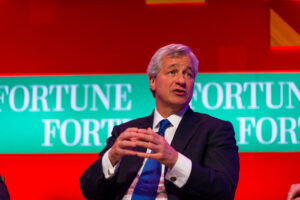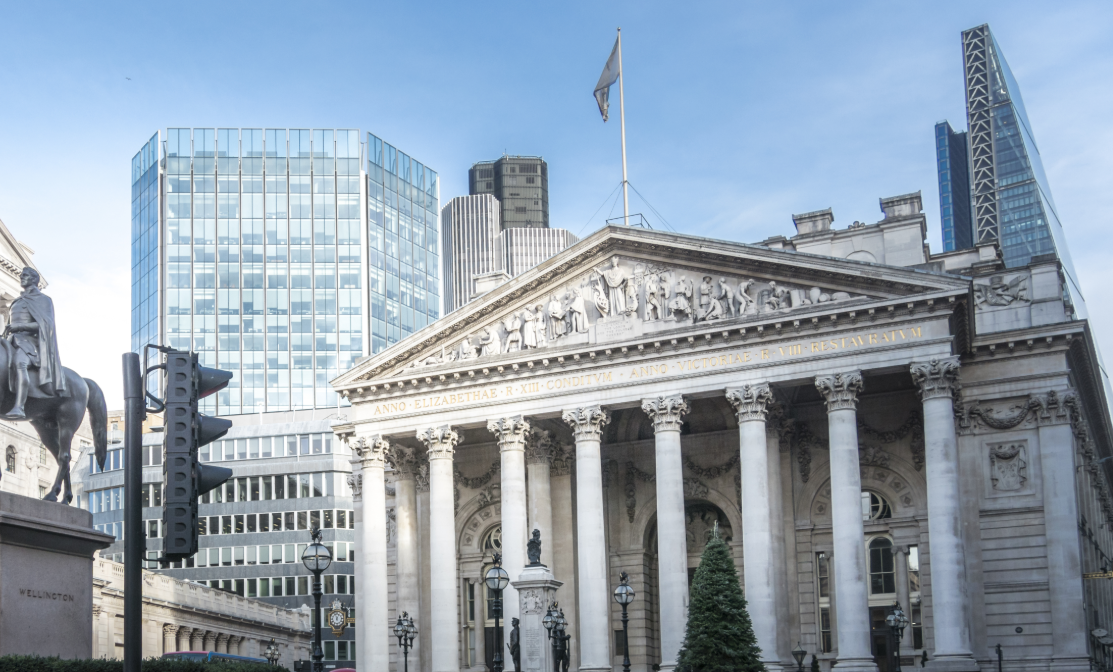Politics after business

and CEO of JPMorgan Chase & Co. — FORTUNE LIVE MEDIA – FLICKR
He is indeed the last man standing in the aftermath of the 2008 financial crisis. Duff McDonald wrote about him in his 2009 book Last Man Standing: The Ascent of Jamie Dimon and JPMorgan Chase. Describing Wall Street post crisis by its flaws— the hubris and the greed — McDonald focused on the opposites that seem to mark him: clarity, consistency, integrity and courage. With his close adherence to such values, he emerged the dominant banking executive of that era, McDonald pointed out.
Jamie Dimon is the current chairman and CEO of JPMorgan Chase & Co. He assumed leadership in 2006 and expects to remain its CEO for the next three and a half years. Forbes puts his net worth at some $2.2 billion while Fortune reported that he called himself “full-throated, red-blooded, patriotic, unwoke, capitalist CEO.” He is not exactly a fan of Donald Trump, having supported anti-Trump Republican candidates in the past.
Business Insider reported that it is not uncommon that some people love to describe him as being in the same league as Ivan the Terrible: “The news that Jamie is flying in is similar to being told that Ivan the Terrible is coming for tea.” After being fired from Citigroup for professional reasons, he became CEO of Bank One in 2000. Dimon became the president and chief operating officer of the merger between Bank One and JPMorgan in 2004, and later in 2006 its CEO. He distinguished himself in JPMorgan when he slashed expenses across the board, putting an end to some of the bank’s unnecessary entitlements, and even cutting in half its managers’ compensation in two years.
One banker was quoted to have said: “He’s going down like cod liver oil.”
But Dimon grew fast in his role as some kind of a senior statesperson. He was instrumental in rescuing some banks from collapse during the 2008 financial crisis. JPMorgan bought Bear Stearns and acquired Washington Mutual, at the time the largest US savings and loan institution. More recently, he worked with Treasury Secretary Janet Yellen and Fed Chair Jim Powell to rally the leaders of the 11 major banks to contribute $30 billion to prevent First Republic from collapsing following the fall of Silicon Valley Bank and Signature Bank.
There was no turning back for JPMorgan under Dimon. Its value skyrocketed and led American banks in terms of domestic assets, market capitalization, and stock value. Bloomberg reported that JPMorgan’s stock value has tripled since Dimon’s assumption as CEO, with an annual profit of about $50 billion.
But Dimon is definitely not above scandal.
Ten years ago, JPMorgan lost $2 billion from risky, unsecured, and derivatives-types trading. Under Dimon’s leadership, Richard Eskow wrote for HuffPost on May 14, 2012, JPMorgan “has paid billions to settle charges that include perjury and forgery, investor fraud and sale of unregistered securities.”
More seriously, JPMorgan has been accused, while under Dimon’s leadership, of allegedly keeping the late sex offender Jeffrey Epstein and his associates as customers despite a number of red flags, reported the Financial Times on Feb. 24, 2023. In fact, no less than the US Virgin Islands has accused JPMorgan of “knowingly, recklessly and unlawfully” facilitating the provision of funds paid to Epstein’s alleged recruiters and victims. Epstein pleaded guilty to state prosecutors in Florida in 2008, was charged by federal prosecutors in New York in 2019 with sex trafficking and abuse but died of suicide in jail a few weeks later.
It is the same JPMorgan Chase CEO who last Monday sent out his annual letter to his shareholders giving his perspective on key issues he thought are existentially important to the success of the firm’s operations and its future viability. Conscious of his enormous influence, Dimon this year dwelt on artificial intelligence (AI), regulatory issues, geopolitical and military conflict and the role of the US, the economy, and JPMorgan’s strategies to advance its various initiatives to achieve diversity and inclusion, some of today’s buzzwords.
On AI, he claimed that JPMorgan is seriously leveraging on it in at least 400 applications. AI helps his firm in detecting fraud, finding new marketing strategies, and deciding on whether generative AI could enhance customer service or software development. There are many gray areas in how AI could change the business landscape, but for Dimon, AI is analogous to the printing press, the steam engine, electricity, computing, and the internet. “We are completely convinced the consequences will be extraordinary and possibly as transformational as some of the major technological inventions of the past several hundred years.”
On regulatory issues, Dimon observed that the financial system appears very highly regulated. More rules were issued after the 2008 global financial crisis’ draconian legislation now known as Dodd-Frank Act. He did not argue against financial regulations per se, but what he railed against was too much regulation: “It would probably be an understatement to say that some are duplicative, inconsistent, procyclical, contradictory, extremely costly, and unnecessarily painful for both banks and regulators.” This is something we also hear from some more medium-sized banks — that they may not have the resources to comply with all these regulations. At least in the Philippines, as far as we know, there is greater collaboration between the regulators and the regulated sector, that the consistency of such partnership should result in less confusion and regulatory uncertainty.
With 28,000 words and numerous footnotes, this year’s letter to the shareholders also talked about geopolitics. Dimon argued that the US should strengthen its place as the world economic leader. He was categorical in reasserting the US’ pivotal role in global politics and economy. He believed the US should remain dominant and this would require a robust economy for support. “In the free and democratic Western world, and, in fact, for many other countries, there is no real or good alternative to America. The only other potential superpower is China.”
He criticized American leadership by saying that the US underestimated China’s economic power. “It’s also true that China has been comprehensively and strategically focused on these economic issues, all while we slept.” Ever a chief executive, Dimon is never for crying over spilled milk. He said, “let’s just fix it.”
He pointed out threats from three angles: overreliance on China in the supply chain, relying on potential adversaries for strategic supplies like in pharmaceuticals and electronics, and weakening other countries’ economic positions and in the process driving them to rely on US’ adversaries.
Dimon is no different from many cold warriors. He argued that America remains the richest nation on earth, and this should not be lost on the Americans in keeping its military strength and, in more palatable words, maintaining its economic and military presence all over the world. This is no less than “Pax Americana.”
Finally, on the economy. Dimon expressed more skepticism than many market pundits. With the market’s 70%–80% probability of a soft landing, the JPMorgan top honcho believed “the odds are a lot lower than that.” Always forward looking, Dimon claimed JPMorgan is braced for various outcomes including interest rates from 2% to 8%, from recession to a robust economy.
This is based on the JPMorgan CEO’s view that inflation may be sticky. This is validated by the US Bureau of Labor Statistics’ announcement of a higher March inflation of 3.5% due to elevated housing and fuel prices.
Dimon’s skepticism also derives from heavy public spending and rising deficits. “The deficits today are even larger and occurring in boom times — not as the result of a recession — and they have been supported by quantitative easing, which was never done before the great financial crisis.”
Why talk about Dimon?
As some kind of a senior statesperson in the financial world, Dimon is undeniably an influential figure, his perspective truly expansive. Some quarters consider him a presidential timber. In fact, Pershing Square Capital Management’s Bill Ackman — he of the hedge fund activist investment fame — tweeted that Dimon should run for president in the upcoming 2024 elections. Obviously, he was triggered by Dimon’s own admission that one day, he would like to serve his country “in one capacity or another.” Six years ago, he even announced he could take on then President Donald Trump.
In subsequent announcements, Dimon regretted having declared his political intention. JPMorgan itself also issued a statement that “as he has said in the past, Jamie has no plans to run for office.”
But politicians, or would-be politicians, could always be duplicitous in speech or action. As the Scripture warns us, by their fruits, you shall know them.
In his case, Dimon has noticeably pushed JPMorgan in new directions that CNBC described as “attempting to tackle some of the country’s intractable issues including healthcare, economic disparity, and urban blight.” If he could deliver on these existential public issues, as he did for JPMorgan, avoiding those transgressions of the past, there is politics after business.
Diwa C. Guinigundo is the former deputy governor for the Monetary and Economics Sector, the Bangko Sentral ng Pilipinas (BSP). He served the BSP for 41 years. In 2001-2003, he was alternate executive director at the International Monetary Fund in Washington, DC. He is the senior pastor of the Fullness of Christ International Ministries in Mandaluyong.




